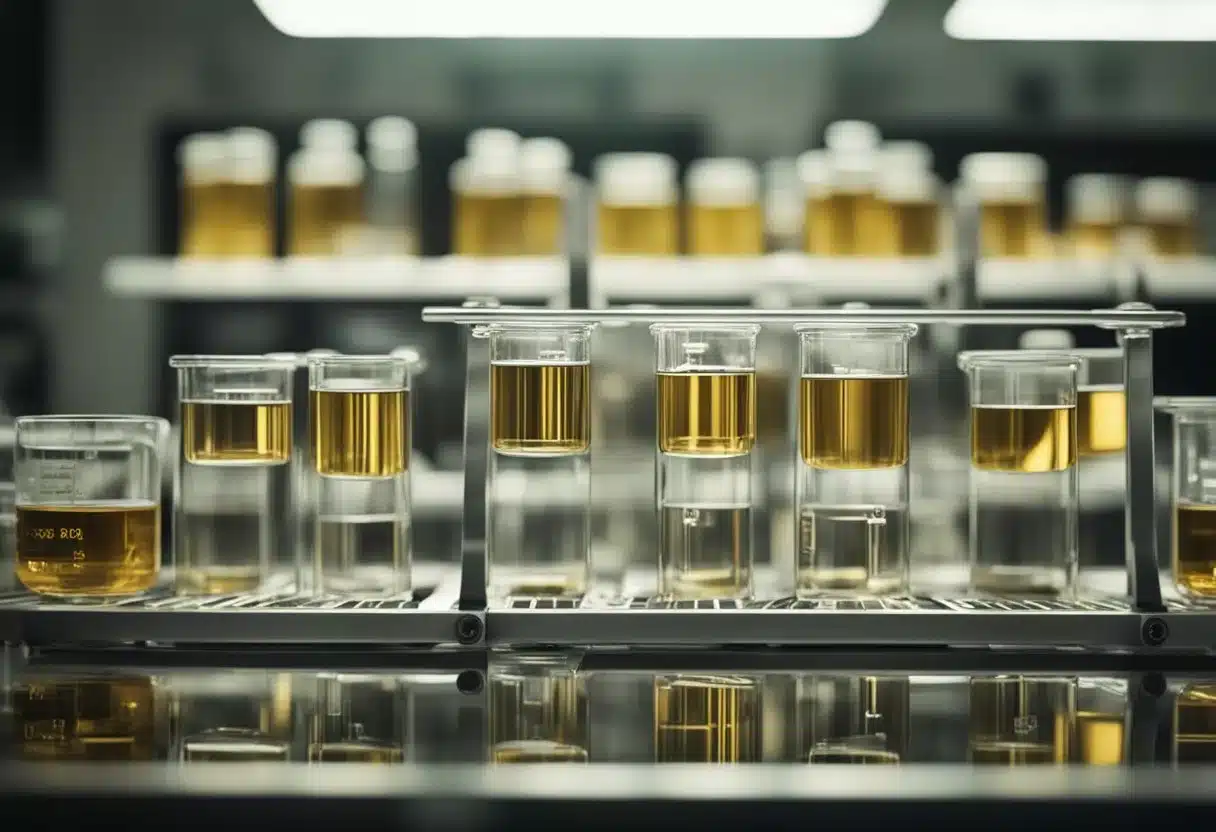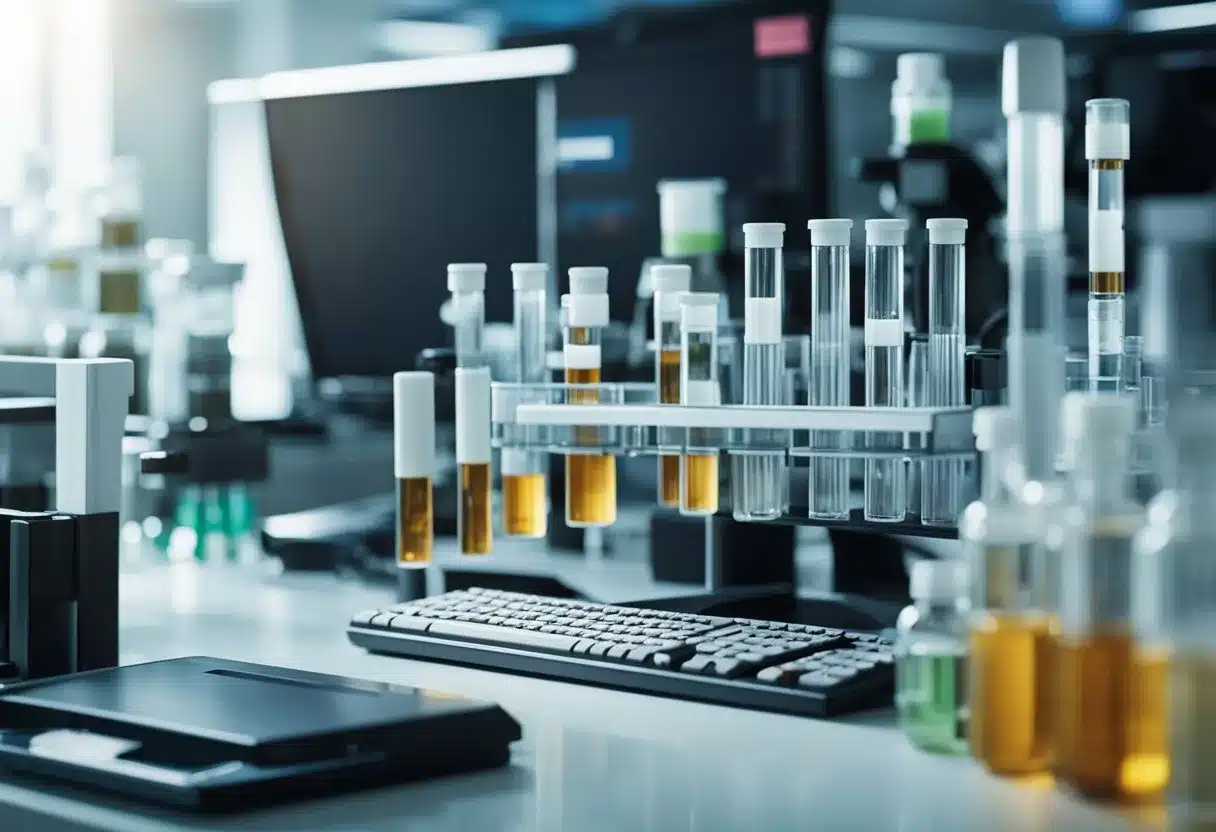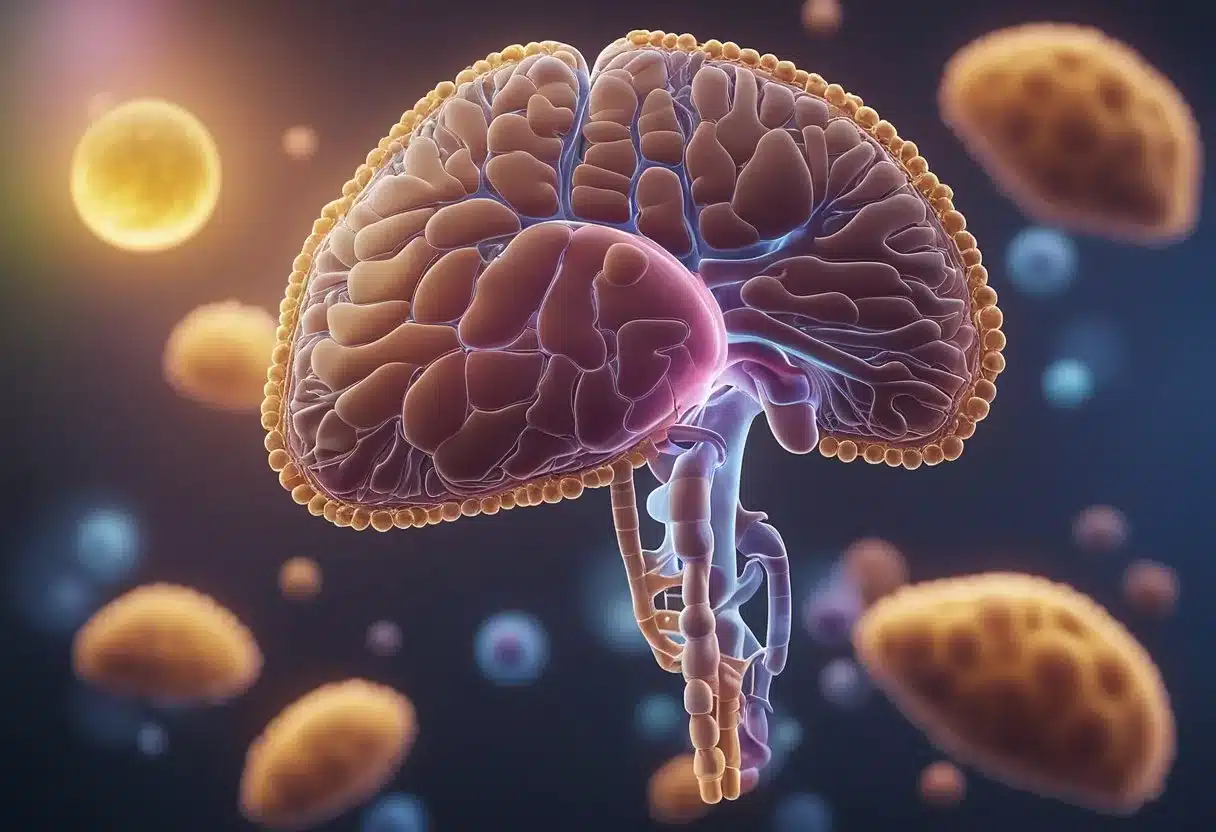Liver enzymes are proteins that help your liver do its job. When these enzymes are high, it can be a sign that something’s not quite right with your liver. High liver enzymes often mean there’s inflammation or damage to liver cells.

Many things can cause high liver enzymes. It might be from drinking too much alcohol, taking certain medicines, or having a liver disease. Sometimes, it’s just a temporary spike that goes back to normal on its own.
If your doctor finds high liver enzymes in your blood test, don’t panic. It doesn’t always mean you have a serious problem. Your doctor will likely do more tests to figure out what’s going on. They’ll look at your health history and may order imaging tests to get a better look at your liver.
Key Takeaways
- High liver enzymes can signal inflammation or damage in the liver
- Various factors can cause elevated liver enzymes, from alcohol use to medications
- Further testing is often needed to determine the underlying cause of high liver enzymes
Understanding Liver Enzymes

Liver enzymes play a crucial role in your body’s health. These proteins help your liver carry out important functions and can signal liver problems when their levels are too high.
Role of Liver Enzymes
Liver enzymes are proteins that speed up chemical reactions in your liver. They help break down foods, remove toxins, and create essential substances your body needs.
When your liver is healthy, it keeps most enzymes inside its cells. But if your liver is damaged, these enzymes can leak into your blood.
Doctors test for liver enzymes in your blood to check how well your liver is working. High levels often mean there’s a problem with your liver.
Common Liver Enzymes: ALT and AST
ALT (alanine transaminase) and AST (aspartate transaminase) are two key liver enzymes.
ALT is found mainly in the liver. High ALT levels usually point to liver damage.
AST is in the liver and other organs like the heart and muscles. It can go up from liver problems or other issues.
Doctors often look at both ALT and AST together. The ratio of AST to ALT can help figure out what’s causing liver damage. ALT is more elevated than AST when the damage affects the cellules of the liver, also called hepatocytes. This type of damage is called hepatocellular damage. Alcohol abuse, however, shows an AST level that is higher than ALT.
Normal ranges (they may change depending on the reference values the laboratory uses):
- ALT: 7-56 units per liter
- AST: 10-40 units per liter
Other Enzymes: ALP and GGT
ALP (alkaline phosphatase) and GGT (gamma-glutamyl transferase) are two more important liver enzymes.
ALP is found in the liver and bones. High levels can mean liver or bone problems. Doctors often check other tests to tell the difference.
GGT is very sensitive to liver damage. It can go up even before other enzymes do. But it’s not as specific, so doctors use it with other tests.
These enzymes help diagnose:
- Liver disease
- Blocked bile ducts
- Bone disorders
- Alcohol use problems
Elevated liver enzymes can be a sign of inflammation in your liver. It’s important to find out why they’re high to protect your liver health.
Causes of Elevated Liver Enzymes

Elevated liver enzymes can result from many different factors. These range from common liver diseases to infections, medications, and lifestyle choices. Let’s explore the main causes in more detail.
Liver Diseases and Conditions
Several liver conditions can lead to high liver enzymes. Fatty liver disease is a common cause. This happens when fat builds up in the liver cells. It can be due to alcohol use or other factors.
Hepatitis is another major cause. This is inflammation of the liver. It can be caused by viruses, alcohol, or the body’s immune system attacking the liver.
Cirrhosis is scarring of the liver. It can result from long-term liver damage. As the liver tries to repair itself, it forms scar tissue. This can raise enzyme levels.
Other conditions include:
- Hemochromatosis (too much iron in the body)
- Autoimmune hepatitis
- Liver cancer
Infectious Diseases
Infections can cause the liver to work harder, raising enzyme levels. Viral infections are a common culprit. These include:
- Hepatitis A, B, C, and E
- Cytomegalovirus (CMV)
- Epstein-Barr virus (causes mono)
Bacterial infections can also affect the liver. Some examples are:
- Leptospirosis
- Q fever
Parasitic infections, while less common, can impact liver function too. These might include malaria or liver flukes.
Medications and Toxins
Many medications can cause elevated liver enzymes. Some common ones are:
- Acetaminophen (Tylenol)
- Statins (cholesterol-lowering drugs)
- Antibiotics
- Some seizure medications
Herbs and supplements can also affect liver enzymes. Examples include:
- Chaparral
- Comfrey tea
- High doses of vitamin A
Exposure to toxins can harm the liver. This includes:
- Industrial chemicals
- Pesticides
- Some mushrooms
Lifestyle Factors and Other Causes
Lifestyle choices play a big role in liver health. Alcohol use is a major cause of elevated enzymes. Even moderate drinking can affect liver function.
Being overweight or obese can lead to fatty liver disease. This is called nonalcoholic fatty liver disease (NAFLD).
Other factors include:
- Lack of physical activity
- Poor diet high in processed foods
- Smoking
Some health conditions not directly related to the liver can also cause high enzymes. These include:
- Celiac disease
- Heart failure
- Thyroid disorders
Rare genetic conditions can affect liver enzymes too. An example is Wilson’s disease, where copper builds up in the body.
Symptoms Associated With High Liver Enzymes

High liver enzymes can cause a range of symptoms. Some people may not notice any signs, while others might experience discomfort or visible changes.
Common Symptoms
Fatigue is a frequent complaint when liver enzymes are high. People may feel tired and weak, even after getting enough sleep.
Nausea and vomiting can occur as the liver struggles to function properly. These symptoms may come and go or persist throughout the day.
Abdominal pain, especially in the upper right area, is another common sign. The pain can be dull or sharp and may worsen after eating.
Some people notice itchy skin or dark urine. These symptoms happen when the liver can’t filter waste products effectively.
Symptoms Indicating Serious Conditions
Jaundice is a key sign of advanced liver issues. It causes yellowing of the skin and whites of the eyes. This occurs when the liver can’t process bilirubin properly.
Severe abdominal pain or swelling may indicate inflammation or fluid buildup in the liver. This can be a sign of serious liver damage.
Unexplained weight loss or loss of appetite can point to more severe liver problems. The liver plays a crucial role in metabolism and digestion.
Confusion or changes in personality might occur in advanced cases. This happens when toxins build up in the blood due to poor liver function.
Diagnosis of Elevated Liver Enzymes

Doctors use several tests to diagnose high liver enzymes. These include blood tests, imaging scans, and sometimes a liver biopsy. The goal is to find out what’s causing the enzyme elevation and check for liver damage.
Liver Function Tests
Liver function tests check enzyme levels in the blood. The main enzymes are ALT and AST. High levels can mean liver problems.
Doctors also look at other substances:
- Alkaline phosphatase
- Gamma-glutamyl transferase
- Bilirubin
- Albumin
- Prothrombin time
Normal ranges vary by lab. Both AST and ALT are important for liver health, but they normally have different significance. Results help doctors decide if more tests are needed.
Imaging and Additional Testing
If blood tests show high enzymes, doctors may order imaging scans. These can show liver size and texture.
Common imaging tests include:
- Ultrasound: Uses sound waves to make pictures
- CT scan: Takes detailed x-rays
- MRI: Uses magnets to create images
Doctors might also check for viruses or autoimmune diseases that affect the liver. This helps find the cause of high enzymes.
Liver Biopsy and its Significance
A liver biopsy is sometimes needed for a clear diagnosis. It’s done when other tests don’t give enough information.
During a biopsy:
- A small piece of liver tissue is removed
- It’s checked under a microscope
- This shows if there’s liver damage
Biopsies are important when enzyme levels stay high without a clear reason. They can find problems that blood tests and scans miss.
Doctors use biopsy results to plan treatment. It helps them decide if medicine is needed or if lifestyle changes are enough.
Treatment and Management

When liver enzymes are high, treatment focuses on addressing the root cause and making lifestyle changes. Healthcare providers may prescribe medications and recommend diet and exercise adjustments to improve liver health.
Addressing the Underlying Cause
Doctors first aim to find and treat the reason for high liver enzymes. This may involve additional tests to pinpoint the issue. Common causes include:
- Viral hepatitis
- Alcohol use
- Fatty liver disease
- Certain medications
Once identified, the specific cause guides treatment. For viral hepatitis, antiviral drugs may help. Alcohol-related issues require stopping alcohol use. Fatty liver disease often improves with weight loss and diet changes.
Medications and Lifestyle Changes
Medications play a key role in managing high liver enzymes. Doctors may prescribe:
- Antiviral drugs for hepatitis
- Steroids for autoimmune liver diseases
- Drugs to reduce liver inflammation
Lifestyle changes are crucial:
- Limit or avoid alcohol
- Eat a balanced, liver-friendly diet
- Exercise regularly
- Maintain a healthy weight
These changes can significantly improve liver health and lower enzyme levels.
Monitoring and Ongoing Care
Regular check-ups are essential to track liver enzyme levels. This typically includes:
- Blood tests every few months
- Imaging tests as needed
- Adjusting treatment based on results
Patients should:
- Take medications as prescribed
- Attend all follow-up appointments
- Report any new symptoms promptly
Long-term care may involve working with a liver specialist. In some cases, a liver biopsy might be needed for a clearer diagnosis. With proper care and monitoring, many people see their liver enzyme levels return to normal.
Impact of Demographics on Liver Enzyme Levels

Liver enzyme levels can vary based on several demographic factors. These differences play a key role in how doctors interpret test results and diagnose liver conditions.
Age and Gender Differences
Liver enzyme levels often differ between men and women. The upper limit for normal AST and ALT levels in men is typically 35 to 40 units per liter (U/L).
For women, this range is lower at 25 to 30 U/L. Age also affects liver enzyme levels. As people get older, their enzyme levels may change.
Doctors consider these age and gender differences when interpreting test results. This helps them avoid misdiagnosis and ensure proper treatment.
Impact of Obesity and Weight
Excess weight can raise liver enzymes. People who are obese or overweight often have higher levels of certain liver enzymes, because they have a higher chance of developing fatty liver.
This is because extra fat in the liver can cause inflammation. The inflamed liver then releases more enzymes into the bloodstream.
Weight loss can help lower elevated liver enzymes in overweight individuals. Even a small reduction in weight may improve liver function and enzyme levels.
Doctors may recommend lifestyle changes for patients with high liver enzymes due to obesity. These often include diet improvements and increased physical activity.
Prevention and Proactive Health Measures

Taking steps to protect your liver can help prevent high enzyme levels. Good habits and regular checkups play a key role in keeping your liver healthy.
Preventing Liver Injury
Avoiding harmful substances is crucial for liver health. Don’t drink too much alcohol. Limit it to one drink per day for women and two for men. Be careful with medicines. Follow doctor’s orders for prescription drugs.
Don’t mix alcohol with pain killers like acetaminophen. This can hurt your liver. Stay away from illegal drugs. They can cause serious liver damage.
Keep a healthy weight. Extra pounds can lead to fatty liver disease. This can raise liver enzymes. Get vaccines for hepatitis A and B to protect against these viruses that attack the liver.
Healthy Lifestyle for Liver Health
Eat a balanced diet rich in fruits, vegetables, and whole grains. These foods have nutrients that support liver function. Choose lean proteins and limit processed foods high in sugar and unhealthy fats.
Exercise regularly. Aim for at least 30 minutes of activity most days. This helps control weight and reduces liver fat. Drink plenty of water to help your liver flush out toxins.
Manage stress through relaxation techniques like deep breathing or meditation. Too much stress can harm your liver over time. Get enough sleep each night. Your liver does important work while you rest.
Regular Screening and Checkups
See your doctor for routine physicals. These visits often include blood tests that check liver enzymes. These are also called “liver function tests or LFTs”. Early detection of high levels can lead to faster treatment.
Talk to your doctor about your risk factors. Family history, certain medical conditions, or medications can affect liver health. Your doctor may suggest more frequent testing if you’re at higher risk.
Be honest about your alcohol use and other habits. This helps your doctor give you the best care. If you have ongoing health issues, work with your doctor to manage them well. Conditions like diabetes or heart disease can impact your liver.
Complications and Advanced Liver Issues

High liver enzymes can lead to serious health problems if left untreated. Liver damage can progress and cause lasting harm to this vital organ. Early detection and proper care are key to preventing severe complications.
Progression of Liver Disease
Liver disease often starts with inflammation. This can lead to fibrosis, where scar tissue replaces healthy liver cells. As fibrosis worsens, it can turn into cirrhosis.
Cirrhosis is severe scarring of the liver. It makes it hard for the liver to work properly. Signs of cirrhosis include:
- Yellowing of skin (jaundice)
- Swelling in legs and belly
- Easy bruising and bleeding
Alpha-1 antitrypsin deficiency is a rare genetic condition. It can cause liver damage and lead to cirrhosis in some people.
Potential for Liver Failure
Liver failure happens when the liver can’t work well enough to keep a person alive. It can occur suddenly or develop over time.
Symptoms of liver failure include:
- Confusion
- Bleeding problems
- Extreme tiredness
Autoimmune diseases can attack the liver and cause failure. In severe cases, a liver transplant may be needed.
Chronic Conditions and Cancer
Long-term liver problems raise the risk of liver cancer. The most common type is hepatocellular carcinoma.
Risk factors for liver cancer include:
- Chronic viral hepatitis
- Heavy alcohol use
- Fatty liver disease
Regular check-ups can catch liver issues early. This helps prevent cancer and other serious problems. Blood tests and imaging can spot changes in the liver before symptoms appear.
Current Trends and Research Advancements

New treatments and diagnostic tools are changing how doctors deal with high liver enzymes. These advances aim to catch liver problems earlier and treat them more effectively.
Emerging Treatments
Scientists are testing new drugs to help people with high liver enzymes. Some of these drugs target inflammation in the liver. Others try to stop fat from building up. Each type of drug addresses specific problems on the liver. Actually, doctors do not treat high liver enzymes, but the causes of elevated liver enzymes or liver function test (LFT) elevations.
One promising area is gene therapy. This method aims to fix faulty genes that cause liver disease. Researchers are also looking into using stem cells to repair damaged livers.
Another exciting field is immunotherapy. This treatment helps the body’s immune system fight liver diseases. It shows promise for treating liver cancer and other hard-to-cure liver problems.
Innovations in Diagnosis and Management
Doctors now have better ways to check liver health. New blood tests can spot liver problems earlier than ever before. These tests look for specific markers that show up when the liver is in trouble.
Imaging tools have also improved. Advanced MRI and ultrasound machines can now see tiny changes in the liver. This helps doctors find issues before they become serious.
Artificial intelligence is being used to read these scans. AI can often spot problems that humans might miss. It’s also helping doctors choose the best treatments for each patient.
Doctors are also using new ways to track liver health over time. Wearable devices and smartphone apps let patients monitor their liver enzymes at home. This helps catch problems early and adjust treatments quickly.
Resources and Additional Information

There are many helpful materials and support options for people with high liver enzymes. These can provide education and connect you with others facing similar health issues.
Educational Materials
Mayo Clinic offers detailed articles about elevated liver enzymes. Their website explains causes, tests, and treatments. Many hospitals provide free liver health brochures. These cover diet tips and lifestyle changes to improve liver function.
Local libraries often have medical reference books about liver disorders. Health websites like WebMD have liver enzyme info written by doctors. Some offer email newsletters with liver health tips.
Support Services and Communities
Online forums let people with liver issues chat and share advice. The American Liver Foundation has local support groups across the US. They host events where you can meet others and learn from experts.
Many hospitals run liver disease support programs. These may include group meetings and one-on-one counseling. Some offer phone hotlines to ask nurses questions. Patient advocacy groups can help you find clinical trials and financial aid for treatments.
Frequently Asked Questions

High liver enzymes can raise concerns about liver health. These questions address common issues related to causes, symptoms, treatments, and recovery for elevated liver enzymes.
Can high liver enzymes indicate the presence of cancer?
Elevated liver enzymes can sometimes point to liver cancer. But this is not always the case. Many non-cancerous conditions can also raise enzyme levels.
Doctors may do more tests if they suspect cancer. These can include scans or a liver biopsy.
What are the potential symptoms one might experience with elevated liver enzymes?
Many people with high liver enzymes don’t feel any symptoms. Some may have fatigue, nausea, or pain in the upper right abdomen.
Jaundice, which causes yellow skin and eyes, can happen in severe cases. Dark urine and pale stools may also occur.
What are common causes leading to high liver enzyme levels?
Fatty liver disease is a frequent cause of elevated enzymes. This can happen from alcohol use or in people who don’t drink.
Other causes include viral hepatitis, certain medications, and autoimmune conditions. Sometimes, enzyme levels rise due to intense exercise.
How can stress impact liver enzyme levels?
Stress can indirectly affect liver enzymes. It may lead to unhealthy habits like drinking more alcohol or eating poorly.
These behaviors can harm the liver and raise enzyme levels. Stress can also worsen existing liver problems.
What are the available treatments for high liver enzymes?
Treatment depends on the cause. For fatty liver, doctors often suggest lifestyle changes. This includes losing weight and cutting back on alcohol.
If medications are the cause, changing or stopping them may help. Specific treatments exist for conditions like hepatitis or autoimmune diseases.
Is it possible for the liver to recover after having elevated enzyme levels?
Yes, the liver can often recover. It has a great ability to heal itself when the cause of damage is removed.
For mild cases, enzyme levels may return to normal with lifestyle changes. More severe cases may need medical treatment to help the liver recover.